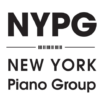
Charles Whitehead is a New Zealand concert-pianist of Maori, English and Samoan heritage and is currently a PhD Candidate at Texas Tech University.
Mr. Whitehead has performed throughoutthe world as a soloist with a diverse repertoire ranging from Orlando Gibbons to Charles Wuorinen. His professional interests extend to chamber music, opera, musical theatre and Latin jazz.
As a PhD Candidate at Texas Tech, he is mentored by Artist-in-Residence, Dr. William Westney and while in the Master of Music and Artist Diploma Programs at Texas Christian University in Fort Worth, he studied with 1985 Van Cliburn Competition Gold Medalist, Jose Feghali. As a resident in Fort Worth, Texas, Mr. Whitehead was actively involved in TCU’s New Music Ensemble, playing solo piano music by Bernard Rands and Ludmila Yurina in US premiere performances. In addition, he has worked extensively as a collaborative pianist, choral director, vocal coach, musical director and arranger.
Mr. Whitehead is the composer of sacred compositions and two original musical theatre works with libretto by Emmy award-winning writer Dr. Richard Allen, both of which premiered in the Dallas/Fort Worth Metroplex.
"Hopefully I can contribute something by being myself and true to what I value in musical performance."
You have a recital at Carnegie Hall in November. Is this your first time performing in New York City?
Yes, it is.
How do you feel about performing in New York City?
New York City has such rich cultural and artistic history and the caliber of people that perform in New York City on a regular basis just doesn’t get any better. To perform there is both daunting and a privilege. On the other hand, audiences deserve respect and respond to artistic truth wherever a performer plays. Knowing this helps to relieve some of the pressure. Hopefully I can contribute something by being myself and true to what I value in musical performance.
Can you tell us about your program? For example, what led you to choose this program for the upcoming concert?
The Schumann Fantasie and Stravinsky’s Petrouchka Suite are pieces I have wanted to play for a long time. Programming them together was a bit risky, but having played this recital a few times now, I have found the feedback to be positive regarding the variety and blend of works.
The Fantasie is a long, complex work and it ends slowly but it is also full of heart and this gives it a strong potential to connect with a concert audience. Petrouchka is such a lively and effective depiction of the ballet music. You learn a lot when you get into the nuts and bolts of this kind of work – for instance, in developing an ear for orchestral color and knowing how this translates to the piano. In terms of technique, it has been important to understand how smaller movements combine to give the effect of larger gestures. You need to know what it feels like to play the smaller ones but there isn’t enough time to separate when playing at tempo.
Since you started your piano studies in New Zealand, can you describe your piano training in New Zealand?
When I was a student in high school, I studied with Margaret Seagrave who had emigrated from England and was a member of IRMTNZ (Institute of Registered Music Teachers of New Zealand). This organization had a student performers group that included string, wind and keyboard instruments and this became a way of introducing young musicians to the joys of playing chamber music.
In addition there were various conferences, competitions and masterclasses by visiting artists and pedagogues from the US and Europe. Younger students participated in the Royal or Trinity School music exams before auditioning for college. As a young musician and competition winner I also had an opportunity to play as a concerto soloist with a youth orchestra.
The emphasis before college was on building solid musicianship rather than a heavy emphasis on technique. At the University of Auckland, I studied with Romanian pianist, Tamas Vesmas who had studied with Dinu Lipatti’s teacher, Flora Musicescu and Yvonne Lefebure. He believed in knowing and respecting the score thoroughly. In addition to an emphasis on Classical and early Romantic music, Tamas really understood Bartok as a profound composer and passed on his love for this repertoire.
I also worked with pianist, Christine Cuming prior to leaving New Zealand for the US. She was invaluable to me in working through Schubert’s Wanderer Fantasie and Bach’s Italian Concerto. I strongly believe that Christine has a unique insight into Schubert and Beethoven that has remained an inspiration to this day. Besides that, her cat is named Franz!
Are you the only musician in your family or do you come from a family of musicians?
My mother, Una, was born in Western Samoa and came to New Zealand as a child. She played the piano by ear and encouraged my brothers and me to learn an instrument. My younger brother, Tim, studied with Frank Gibson Jr. and is one of New Zealand’s finest drummers with a great admiration for Elvin Jones, Tony Williams, Jack DeJohnette and Keith Moon. He would be playing to Miles Davis recordings downstairs in the house while I would be upstairs practicing Beethoven and Mozart! He has played with many visiting artists including Mike Nock and is a very versatile musician.
Who were some of your mentors when you were studying piano in New Zealand?
Michael Houstoun and Deidre Irons have been making a profound impact in New Zealand music for decades now, both in the standard repertoire they play and their commitment to New Zealand music. They have always inspired me by their wisdom, their commitment to artistic process and the consistently high level of accomplishment they reach in performance. Deidre has a wonderful solo recital CD for the Morrison Music Trust label and Michael has performed all the 32 Beethoven Sonatas and Bach’s Well Tempered Clavier in recent years. Early in his career, Michael was a finalist in the Van Cliburn, Leeds and Tchaikovsky Competitions.
You have studied with José Feghali, a Cliburn winner. Can you share your experience studying with him? How has he helped you artistically/pianistically?
Jose was a genuinely warm human being and one of the few professional pianists I have met equally adept in the tech world. He also had a great sense of humor. I remember one semester when he decided to fine us if we didn’t follow the exact details of the scores we were playing. It might have been fifty cents for a misreading or a quarter for ignoring a dynamic, phrasing or articulation mark. He made a list that had a different amount owing for each infringement. This was our responsibility and he wanted us to know that we should take it very seriously. I think he took money from all of us!
Jose loved a beautiful singing sound and it was inspiring to hear him demonstrate in the lessons. He advocated a full-body sound for the big romantic works and this helped my playing a great deal in works like Chopin’s C minor Nocturne and the B-minor Sonata. Octaves came from the wrist, arm or shoulder depending on the tempo and sound required. He was very particular about character, clarity and articulation in Mozart’s Sonata K311 in D major. Jose introduced me to flutter pedaling technique and loved working out technical problems. He had a resourceful mind for fingerings and redistributions between hands. He was extremely generous in playing the orchestral accompaniments for our recitals that included concertos.
Jose must have been one of the few pianists around that could make the second piano part of a Chopin Concerto sound more convincing than the solo part! As a recording professional, he used his own high-end equipment to record his students’ recitals both in our dress rehearsals and in performance in Ed Landreth Auditorium at TCU.
I loved to hear about his experiences in London as a student. One of his most profound concert recollections was hearing Celibidache and Michelangeli performing the Faure Requiem and the Ravel G-major Concerto. There is a live recording of this concert. He was present for Horowitz’s London recital in the early 1980s. Jose won the chamber music prize at the 1985 Van Cliburn Competition playing the Dvorak Quintet. I was fortunate to hear him play the Liszt Sonata and the Ravel Trio in Fort Worth, Texas when he was in particularly good form. He introduced me to the Rubinstein, Heifetz and Piatigorsky recording of the Ravel Trio, which is still a phenomenal listening experience. I also have vivid memories of a duo recital Jose played with James Galway and a concert playing Rachmaninov’s Rhapsody on a Theme of Paganini with the Dallas Symphony, which also featured Alexei Sultanov playing the Tchaikovsky Concerto No.1.
Who are some of your favorite composers and pianists?
I feel like I have always loved Mozart, Beethoven and Chopin. Bach came later after tackling a few of the big suites. It wasn’t until I had worked my way through playing the major Schumann’s song-cycles that the more enigmatic piano music opened up for me. The same can be said about my admiration for Debussy and Schoenberg’s piano music – the vocal music helped me to find and communicate layers of expression in their piano works. Schoenberg’s Op.11 No.1 was my gateway piece into this repertoire and learning to appreciate Schoenberg opened up a lot of other more challenging 20th Century repertoire. I really admire the playing of Roger Woodward, David Burge, Gilbert Kalish and Paul Jacobs in the modern works of last century. I also greatly admire Liszt’s music – he demands the utmost of technique and imagination from the pianist as well as a feeling for genuine Romantic rhetoric. I always go back to hear Cziffra, Arrau, Bolet and Cortot to remind myself what genuine Romantic rhetoric and emotional power sounds like.
Charles Whitehead performs on Saturday, November 18, 2017 at Carnegie Hall. For tickets, click here. Learn more about Charles Whitehead at www.charleswhiteheadmusic.com.

